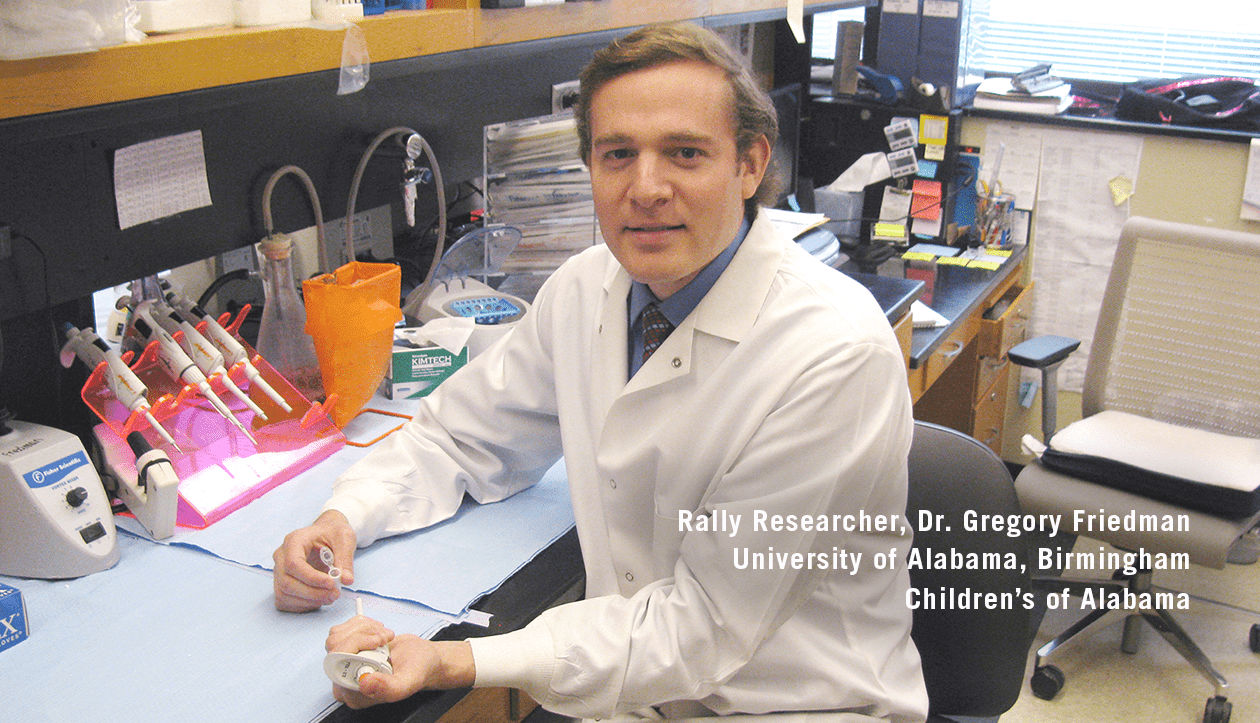Research for Recurrent Brain Tumors Shows Promising Preliminary Results

One such treatment has shown promising preliminary results, and the therapy involves an unexpected source: the common cold sore virus, otherwise known as herpes simplex or G207. Thanks to Rally Foundation funding, Dr. Friedman and his team were able to alter the virus to kill cancer cells, while also obtaining critical preclinical data needed to conduct a pediatric study. So far, out of seven children, the early results show the therapy to be safe, tolerable and promising.
In order to gain a better understanding of his research and the clinical trials, we sat down with Dr. Friedman to find out the following: how pediatric virotherapy and immunotherapy compare to traditional cancer treatment; what his research means for clinical trials; and, why funding is vital when it comes to developing new therapies.
Signs, Symptoms and Standard Treatment for Brain Tumors in Children
According to the American Cancer Society, brain and spinal cord tumors are the second most common cancers in children after leukemia. When a child is diagnosed with a brain tumor, the symptoms can vary depending on where it is located. Often, children will experience headaches, nausea, vomiting, and difficulty with balance. Occasionally, a tumor can cause seizures, weakness, numbness, vision changes, or difficulty with speech or swallowing.
The prognosis depends on several factors: the type of tumor, the location and the molecular genetics of the tumor. Some types, like brainstem gliomas and glioblastoma, have very poor outcomes, with survival rates of zero-to-10 percent. Survival rates for medulloblastoma, the most common malignant brain tumor in children, range from 50-to-80 percent. Overall, the National Center for Health Statistics confirms that brain cancer is the leading cause of cancer deaths among children and adolescents.
Treatment depends on the size and type of tumor, as well as where it is located but, in general, treatments can include surgery, chemotherapy and radiation. These therapies, however, can be damaging to a child’s developing brain and can result in lifelong disabilities in survivors. This is why researchers seek new, targeted therapies to improve outcomes and lessen any risk of toxic side effects for patients.
Understanding Virotherapy & Immunotherapy in Relation to Recurrent Brain Tumors
One of the promising, less harmful approaches to treatment is virotherapy, a type of immunotherapy that utilizes a virus to kill cancer cells and to stimulate the immune system to attack the tumor. Currently, many different viruses are being studied as possible cancer treatments. Some are harmless to humans, while others—like the cold sore virus—need to be genetically altered in order to kill cancer cells without harming normal cells.
The cold sore virus is an ideal virotherapy/immunotherapy agent for a number of reasons. First, it can infect and kill cancer cells while stimulating a robust immune response against the tumor. Second, the virus has been studied extensively, so the essential and nonessential genes have already been identified. The nonessential genes can be replaced with foreign human genes. As the virus replicates, the foreign gene can enable the production of substances that enhance the immune response against the tumor. In addition to that, there are also drugs available to treat infection, in the unlikely event the altered virus causes problems.
Over the last 30 years, treatment for pediatric malignant brain tumors has improved marginally, with enhancements made in surgical techniques, new strategies for delivering radiation, and a few new traditional chemotherapy agents. More recently, however, there has been a scientific boom in understanding the molecular characteristics of tumors which help define tumor behavior and provide these new targeted avenues for treatment. This has led to the development of many different types of therapies including antibodies, small molecule inhibitors and immunotherapies.
Promising Treatments Ahead
Dr. Friedman’s overarching goal is to improve outcomes for children with brain tumors, by developing and improving novel, targeted immunotherapies in the lab and then translating these therapies to clinical trials. The doctor and his team are currently studying a cold sore virus that has been genetically altered so it cannot harm normal brain cells but can infect and kill tumor cells, all while stimulating the patient’s own immune system to attack the tumor.
The team’s first-generation virus is currently in a Phase I clinical trial for children with brain tumors and has, so far, shown great promise. Among the findings: it’s been safe and tolerable in all patients; and, there’s evidence of efficacy in many patients, including one child that was more than two years out of treatment without any additional therapy. The team is taking the findings back to the lab (bedside-to-bench) to improve the therapy further—by developing newer viruses, unique routes of delivering the virus, and unique combination therapies with the virus—to maximize the anti-tumor response from the immune system. Dr. Friedman will then take his discoveries from the lab back to the clinic (bench-to-bedside) to conduct new clinical trials to hopefully improve outcomes and lessen side effects for children, who are in desperate need of new and improved therapies.
Dr. Friedman’s Personal Journey in Cancer Research
While overall survival rates for childhood cancers have improved greatly, the outcomes for malignant pediatric brain tumors have lagged behind other types of cancer. For those that survive, there are known cases of long-term disability from the treatments and the disease itself.
“There is an incredibly great need for new, targeted, less-toxic agents for this vulnerable population of patients, and that need is really what attracted me to research in this area,” Dr. Friedman told us. For him, the most exciting and promising research projects are immunotherapies, which harness the patient’s own immune system to attack the tumor.
There are many different approaches being tested, including: antibodies to block proteins that tumors use to evade the immune system attack; tumor vaccinations; immune cellular therapies such as chimeric antigen receptor (CAR) T-cells or natural killer cells; and, virotherapy. “Likely, a combination of these approaches will be most effective,” explains Dr. Friedman. The first step is to get the child’s immune system to recognize the tumor as abnormal and to begin to attack it. Then, the goal is to increase and maintain the attack on the tumor. He says even if the immune system can just keep the tumor in check—and keep it from growing—it would provide significant benefit for the patient.
“I have learned something from every patient I have treated,” says Dr. Friedman. “These lessons have ranged from how to handle adversity, to communicating more effectively with children and families; from managing unexpected side effects, to considering and offering new treatment approaches.” He shared that his goal is to treat each patient and family like he would want his own child and family treated.
“One of the first children with a brain tumor I took care of was a three-year-old with a highly aggressive ependymoma. The tumor wrapped around the brainstem and, during the surgery to remove the tumor, the child suffered a brain injury and was in the ICU for months. The child lost the ability to talk and walk, and we were not certain if any recovery was possible.”
“Against all odds,” he continued, “the child made a miraculous recovery and, through hard work and determination, returned to walking, talking and playing. Unfortunately, the disease was a really bad disease and the tumor returned.” Friedman explained: “When it did, we lacked effective treatment options, and ultimately, the disease took the child’s life. This was incredibly difficult for everyone involved—to watch the child courageously fight back—only to lose the battle against the disease. This definitely heightened my passion to develop new therapies.”
How Rally’s Funding Helps Make It Possible
“Rally’s support has been instrumental in my development as a researcher and the development of bench-to-bedside translation of immuno virotherapy for pediatric brain tumors,” says Dr. Friedman. “The support enabled us to obtain essential preclinical data that was used to procure a FDA investigational new drug application and to conduct a clinical trial. The support was also a springboard to help me obtain critical federal funding to conduct the clinical trial and to advance the research further in the lab. I’m incredibly grateful for the Rally Foundation and the generosity of the multitude of Rally Foundation donors that have made our research possible.”
Want to make a difference? You can help Rally Researchers, like Dr. Friedman, discover new therapies that lead to clinical trials and, eventually, cures. Donate today!
